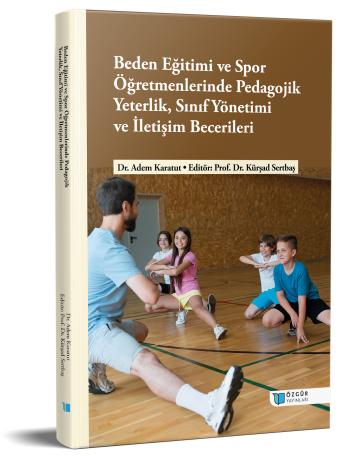
Beden Eğitimi ve Spor Öğretmenlerinde Pedagojik Yeterlik, Sınıf Yönetimi ve İletişim Becerileri
İndir
Özet
Amaç: Bu araştırmada Beden Eğitimi ve Spor öğretmenlerinin pedagojik yeterlik algılarının sınıf yönetim stilleri ve iletişim becerileri açısından incelenmesi amaçlanmıştır.
Yöntem: Bu araştırma ilişkisel tarama modeli kapsamında betimsel bir çalışmadır. Araştırmanın evrenini Beden Eğitimi ve Spor öğretmenleri oluştururken örneklemini Marmara bölgesinde çalışan öğretmenler oluşturmuştur. Örneklem seçiminde basit tesadüfü örnekleme yöntemi kullanılmıştır. Araştırmamızda toplamda 1614 kişiye ulaşılmıştır. Daha sonra yapılan aykırı uç değerler analizi sonucu 75 anket formu analizden çıkartılarak 1539 form üzerinden analiz yapılmıştır. Araştırmada veriler katılımcılara yüz yüze ulaştırılmıştır. Araştırmanın veri toplama araçları dört kısımdan oluşmaktadır. İlk bölümde katılımcının kişisel özelliklerini ölçmeye yönelik cinsiyet, yaş, medeni durum, eğitim durumu, mesleki tecrübe ve çalışılan eğitim kademesi soruları yer almaktadır. İkinci kısımda Adıgüzel (2017) Pedagojik Yeterlik Algısı Ölçeği, üçüncü kısımda Bosworth (1997) tarafından geliştirilen Türkçe uyarlaması Aktan ve Sezer (2018) tarafından yapılan Sınıf Yönetimi Stilleri Ölçeği ve dördüncü kısımda Korkut (1996) tarafından geliştirilen İletişim Becerilerini Değerlendirme Ölçeği kullanılmıştır. Verilerin analizi SPSS 25.0 paket programında yapılmıştır. Ölçüm aracının güvenilirliği Cronbach alpha ile tespit edilmiştir. Verilerin normal dağılımdan gelip gelmediği basıklık çarpıklık katsaytılarına bakılarak karar verilmiştir. Ölçekler arası ilişki arasındaki ilişki pearson korelasyon testiyle belirlenmiştir. Ardından etki durumlarını incelemek için hiyerarşik regresyon analizi uygulanmıştır. Ayrıca İstatistiksel açıdan, frekans analizi, Manova analizi yapılmıştır. Analiz yapılırken %95 güven aralığına göre yapılmıştır.
Bulgular: Katılımcıların yaş değişkeni ile sınıf yönetiminin ilgisiz alt boyutunda istatistiksel yönden anlamlı farklılaşma olduğu, eğitim durumu ile sınıf yönetiminin yetkeci alt boyutunda lisans mezunu öğretmenler lehine istatistiksel yönden anlamlı farklılaşma olduğu, mesleki tecrübe değişkeni ile pedagojik yeterlik algısının ders giriş etkinlikleri alt boyutunda ve sınıf yönetiminin serbest ve ilgisiz alt boyutlarında istatistiksel yönden anlamlı farklılaşma olduğu ortaya çıkmıştır (p<0.05).
Sonuç: Sonuç olarak araştırmamızda öğretmenlerin pedagojik yeterlilik algılarının yüksek olduğu, sınıf yönetimi ortalama puanlarının düşük olduğu, pedagojik yeterlik algılarının sınıf yönetim stilleri ve iletişim becerileri arasında ilişki olduğu ve iletişim becerilerinin çok yüksek düzeyde olduğu ortaya çıkmıştır. Ayrıca Beden Eğitimi ve Spor öğretmenlerinin pedagojik yeterlik algıları, sınıf yönetim stilleri ve iletişim becerileri arasında ilişki olduğu ortaya çıkmıştır.

